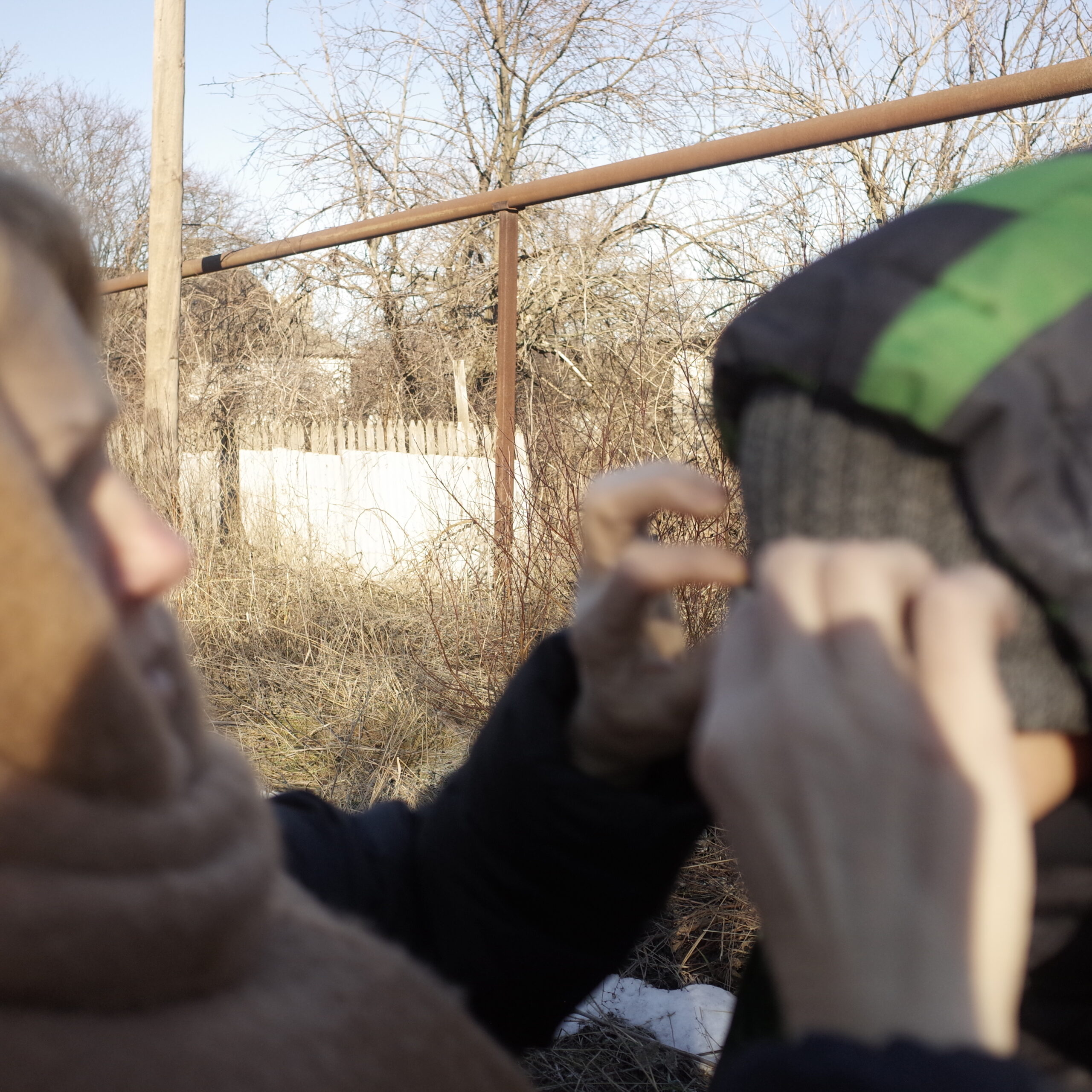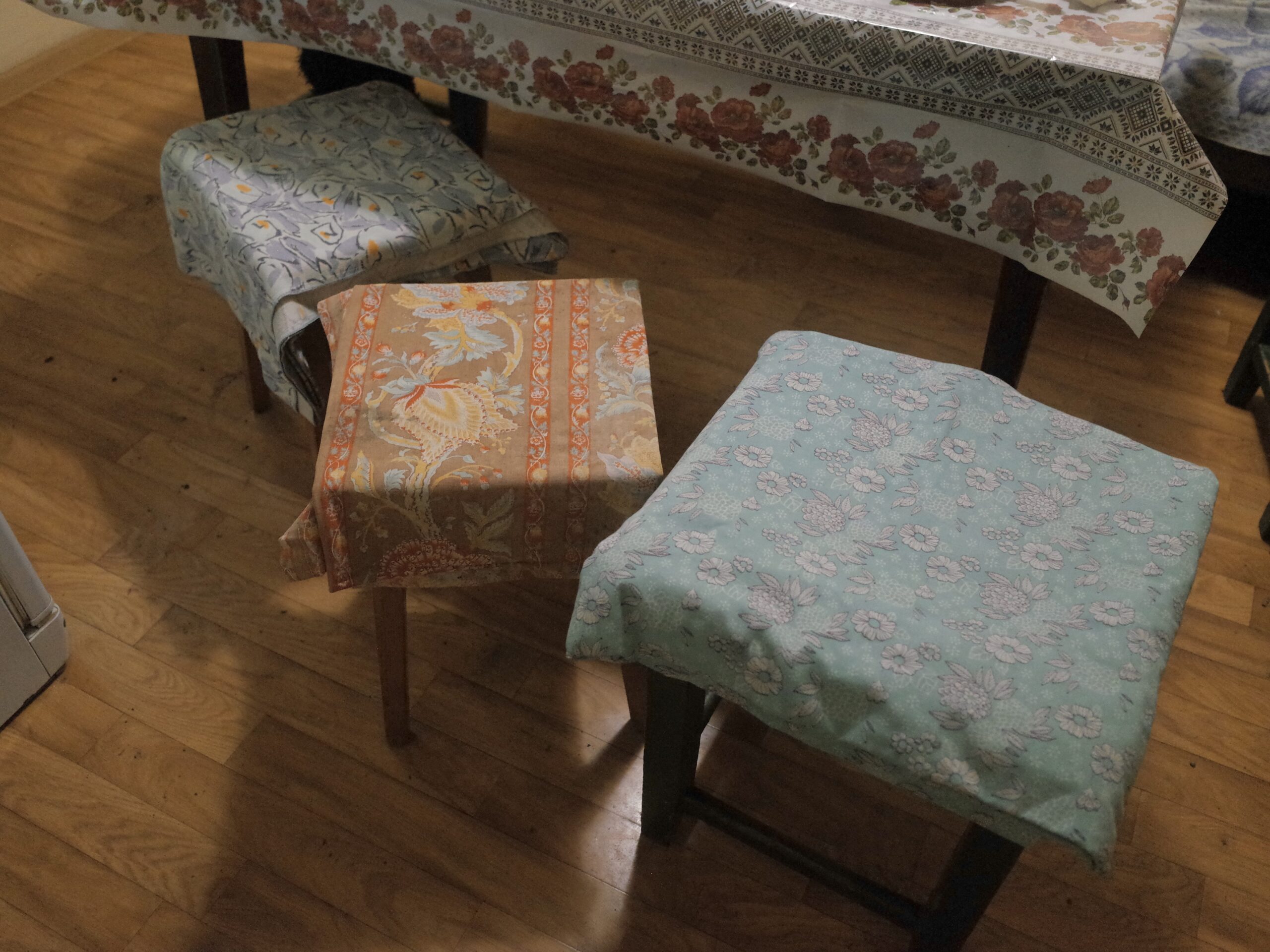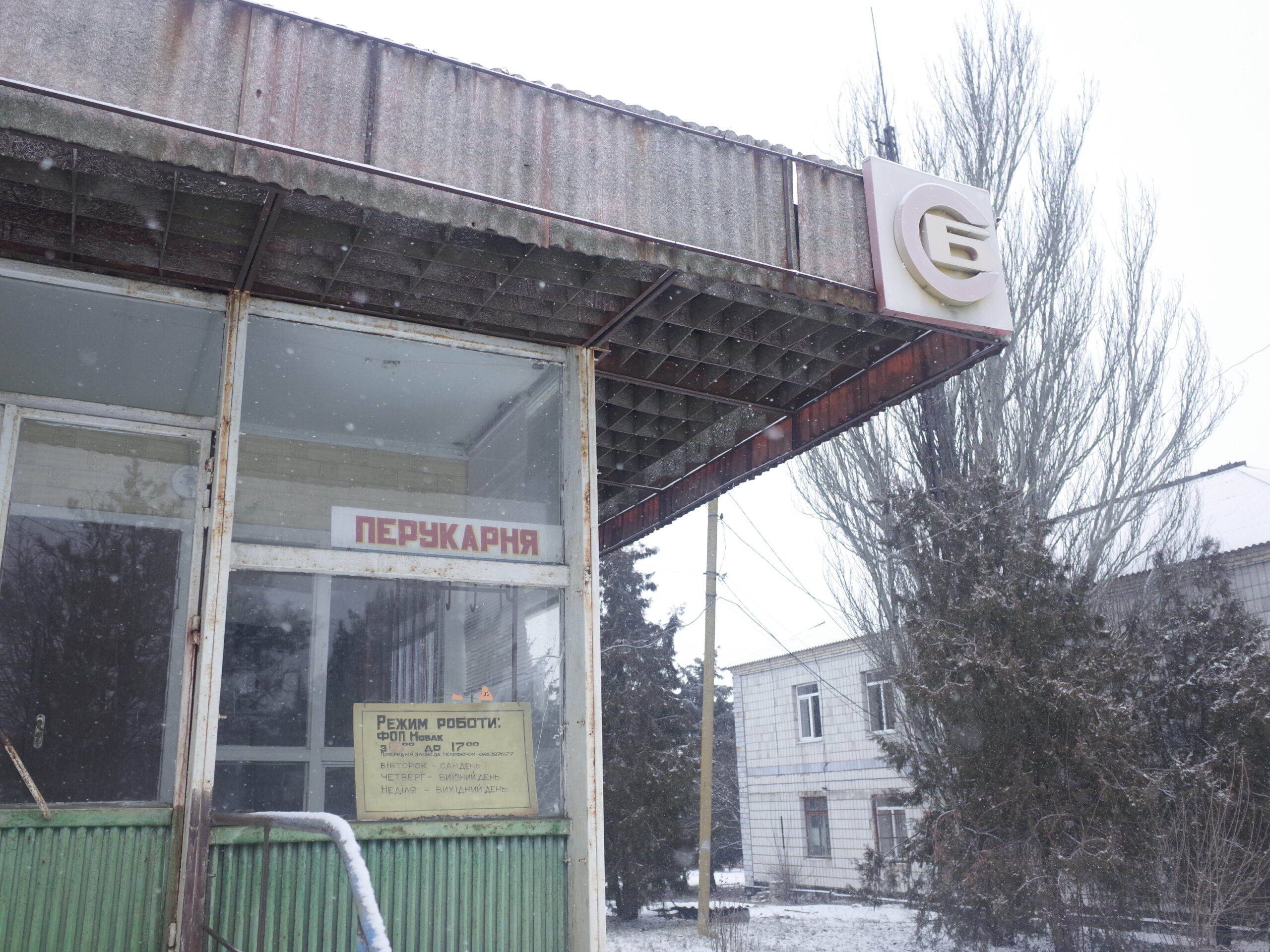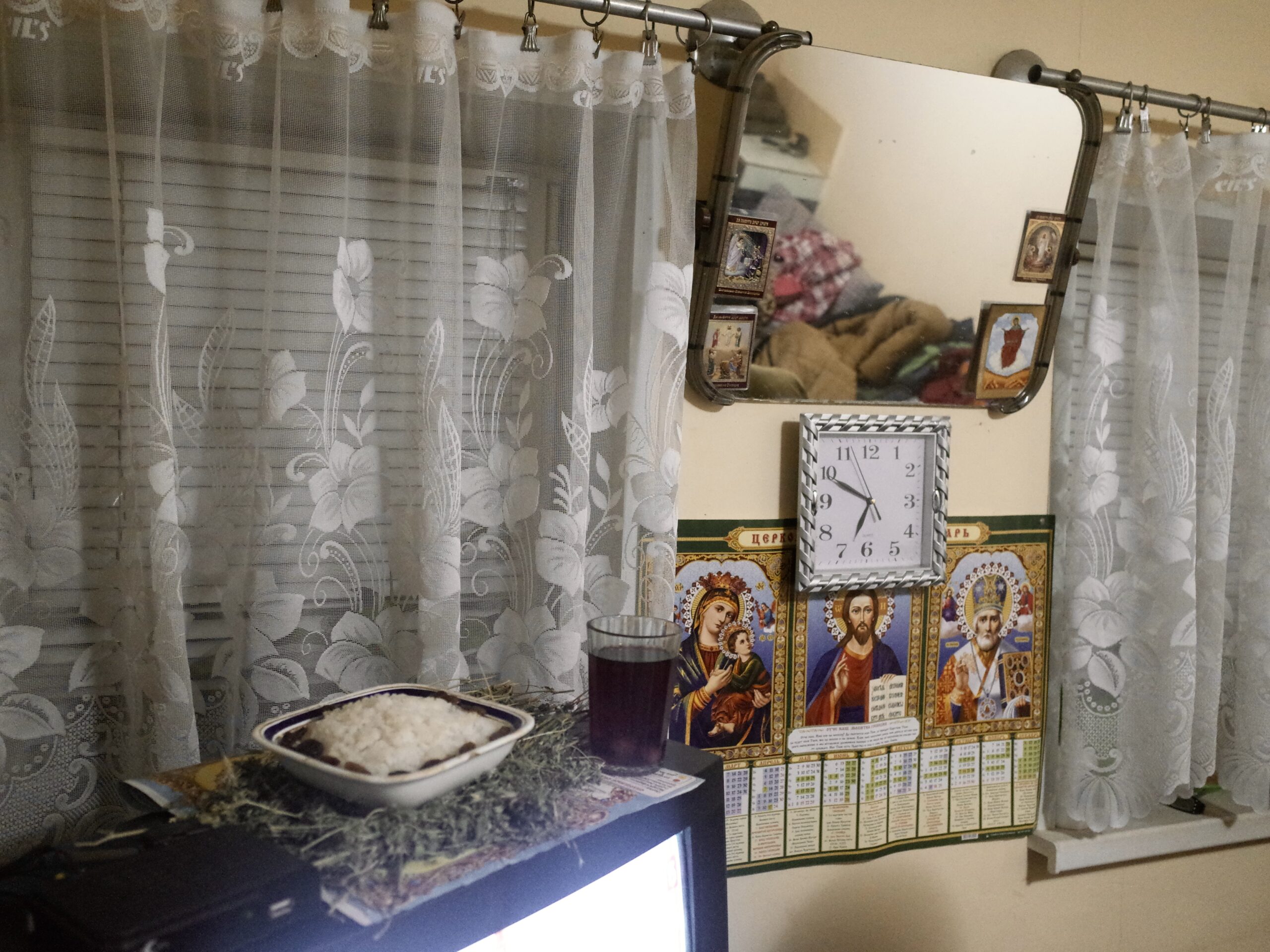Surzhyk: A Transparent Double Mask
In this text, researcher and Surzhyk speaker Milena Khomchenko analyses how a mother tongue might undergo several layers of non-recognition and erasure. Expanding on the Frantz Fanon’s concept of ‘a white mask’ from his work ‘Black Skin, White Masks’, she proposes a concept of ‘a transparent double mask’ to designate the process of mimicking the dominating environment, in this case Ukrainian and Russian-speaking ones, that a Surzhyk-speaking person experiences. In this psychoanalytic and philosophical examination, she looks at her non-established language as a method to undermine the power apparatuses, which impose the dichotomy of the opposing established languages.
This text was written in April 2023 during my studies at the master’s programme in Aesthetics and Art Theory at CRMEP in Kingston University London as part of the module ‘Modes of Subjection’, convened by Stella Sandford. After I submitted it, I did not share it any further and rereading the text now I remembered why. The text contains many highly personal stories connected to my language identity which I am still afraid to share publicly. It is as though it were a secret diary no one is intended to see. The level of honesty I reached in this text was keeping me from publishing it for more than a year until now. I want to share it with others who will be able to share similar experiences back to me.
It also responds to the current active discussions on whether it is appropriate to discuss Ukraine in the context of the post- and decolonial theory, and to questions around whether the Soviet Union together with its predecessor Russian Empire and its successor Russian Federation was/is an empire. The question for me was how to expand and exercise the theoretical limits relying on knowledge and historical context of Ukraine as, in addition to surviving the imperial war Russia is conducting in Ukraine, we are also witnessing a theoretical lack of recognition of us in the West. This blind spot within Western academia was not surprising since empire inevitably tries to erase or alternate the identity and its representation of those it intends to dominate.

‘A Magic Vault of Distance’
Giving an account of French influence on the self-perception and identity of Black people, Frantz Fanon speaks of a person from Martinique’s transformation when they return home after living in France. Everything about them changes: the way they walk, their posture, a form of greeting—as if their ‘phenotype undergoes a definite, an absolute mutation.’ [1] They undergo an additional lingual transformation; they have to eliminate their accent and speak French as ‘a white man.’ This transformation is rooted in a long history of colonialism and oppression; French linguistic superiority is made apparent through the segregation, which is also apparent in the Antilles—the middle-class people speak Creole only to their servants, and the families forbid their children to speak Creole. [2] After emigrating to France, the pressure causing the transformation of their own identification and social representation further deepens, and moreover becomes fixed in the unconscious as Creole is more and more repressed. At once, a ‘newcomer’ gets access to all the resources that are not available in their home country. When returning home to the Antilles, this newcomer from France feels superior to the formerly closest social network as a result of an inferiority complex gained abroad. Struggling from an inferiority complex in Europe, the repressed feeling of shame surrounding their primary identification re-emerges as the feeling of superiority at home. While talking to peers who have never left the Antilles, they suddenly occupy the position of the French—as when they start answering only in French, no longer understanding Creole or forgeting specific words. [3]
“To speak means to be in a position to use a certain syntax, to grasp the morphology of this or that language, but it means above all to assume a culture, to support the weight of a civilization.” [4] For a Black person from the Antilles, French embodied a ‘magic vault of distance’; it would be a special tool, which would give the entrance to the possession of another life, another culture, another world. Although I am not arguing for the parity of these histories, another experience of a language subjection would happen to a person from the rural area of the Donetsk region—Russian, for a long time, was that magic key to recognition.
There is a common misunderstanding that the native language of people in the south-east of Ukraine is Russian, that they cling to a Russian identity and that they have a pro-Russian political position. In fact, the rural areas of the region – as is the case across almost the whole of Ukraine, and including my village, Bohoiavlenka, which is in the Donetsk region – mostly do not speak Russian as well as they do not speak literary Ukrainian. The tongue we share is Surzhyk, which represents a concrescence of Ukrainian and Russian on both phonetic and morphological levels. It differs from Creole since Surzhyk is created on the basis of cognate languages and does not have a simplified grammar structure. However, in addition to the hybridisation processes natural to all languages, its history is also based on the imperial labour migration of Russian workers to administer the industrial production in times of the Russian Empire, later prohibition policies of the Ukrainian language for print and education by Soviet authorities, and cultural and lingual expansion continuing after the break of the USSR. Therefore, historically, rural areas of the south-east of Ukraine are mostly dwelled in by Surzhyk-speaking people, whilst the urban parts of the region are generally populated by Russian speakers, who, due to the influence of the superiority of Russian, are used to despising the rural dwellers for not possessing ‘any proper language.’ Russian imperialism tried to establish a rule of a single language, Russian, so that not only Surzhyk, but also Ukrainian was reduced to a second-sort level.
Just as Fanon said, speaking a language means taking on a world. [5] Language carries history of its people as well as ambitions of its emperors; culture and spirit of language is transferred not just in semantics and phraseology, but also in its morphology, phonology, and syntax.
By falling under the influence of Russian linguistic imperialism and answering the need of speaking Russian, a Surzhyk-speaking Ukrainian loses that former self. By counter-establishing a standard of literary Ukrainian and repeating its vision of a ‘correct’ language, they unconsciously reproduce the imperial paradigm. By speaking Surzhyk, a Ukrainian falls faceless, because any authority standing above would not grant recognition to a person not possessing such an identity-specifying tool as language.
Throughout his book, Fanon makes continual references to the concept of a white mask: when a Black man ‘puts on the white world’ and speaks proper French, when French people approach Black men with an enthusiasm that they are truly a white man after listening to their public lecture conducted in French. [6] French becomes a white mask a Black person puts on to be recognised. Russian, though, will never be a visible mask for a Ukrainian since they share similar features of appearance and the same skin colour. For a Ukrainian, a mask will be transparent so that other people might not even notice it until they themselves might forget who they are.

Subjection and Subjectivation
From early childhood, many generations of Ukrainians were surrounded by the huge presence of Russian culture: we cooked Russian salads for the New Year while watching their romcoms or listening to their pop groups. We learned Dostoevsky as part of the school curriculum and lived on the streets named after Pushkin. The Russian state attempted to construct the environment of Ukrainians in a way to present Russian identity as big, noble, and prestigious, in order to grow inside our psyche a desire to absorb the ‘Russian world’ to be the same ‘superior’ people, while our own culture and history was pushed into the background. A Surzhyk-speaking Ukrainian had to learn to speak Russian better and better day after day, so that one day they could also forget that Russian was never their native language.
As a result of its repeated invasions not only of Ukrainian sovereignty but also of the identification of Ukrainians, the Russian state influenced the alteration of the political identity of Ukrainians. For centuries, its goal was not the elimination of Ukrainian identity but the modification of the existent one, making them believe they were similar to Russians deep in their unconscious. According to Freud, ‘Ego is that part of the id which has been modified by the direct influence of the external world through the medium of the perception-consciousness.’ [7] The appearance of a transparent mask witnesses a modification of the Ego from the outside. The ‘I’ of a Ukrainian, when meeting the Other of the Russian power, which wishes absolute domination within and outside itself, embodies it into its own Ego. A Ukrainian is, thus, not becoming the Other, but incorporates the Other into the structure of their own ‘I’.
According to Foucault, the cultural unconscious consists of the implicit systems of limits and exclusion, in which people find themselves prisoners and which they practise without being aware of it. [8] Imposing the Russian-speaking environment on the generations of Ukrainians, the cultural unconscious is produced. As an ordinary example, in the 2000s, the TV channels devoted to Ukrainian music were full of Russian music videos, and, after the long decades of Russia’s cultural export, seeing their product as foreign was harder and harder.
Russian culture was intended to be a culture of Ukrainians. Ukrainian culture was made to suffer or not exist.
Those who resisted were killed—one of the many examples is the Executed Renaissance, a number of Ukrainian artists, directors, writers, and other cultural figures part of whom were persecuted and killed in Sandarmokh, Russia during several months of 1937 while others disavowed the inevitability of such a fate by committing suicide.
In The Subject and Power, Foucault writes about a post-Christian form of domination that is exercised through understanding, direction, and manipulation of people’s minds and secrets. [9] This type of power is characterised by the simultaneous individualisation and totalisation: it is simultaneously looking after every person but doing so in order to create an army of clones. When Russia’s power apparatus is in action, it first subjects a person to itself and later replaces their self-perception by means of subjectivation. In the process of subjection, the power is acting by force. It is interfering with the individuals by shaping their subjectivity in a restricting and limiting way so that their ‘I’ conformes with the visions of the authority and their agency is omitted to be recognised. In the process of subjectivation, the individuals are not passively subjected but supposedly have a voice in becoming a subject. However, the external influences as such of the authorities are not gone and might be internalised. Thus, numerous generations of Ukrainians were forced to speak Russian both by the emphasis on its ‘superiority’ as well as the prohibitions placed onto the Ukrainian language — after the first generation was subjected to speaking Russian, the next one was already born subjectivated to Russian as their native language.
In this text, I also juxtapose the political concept of identity with a psychoanalytic concept of identification, because the identity of Ukrainians was influenced by massive and ubiquitous penetration of the collective psyche. After the long-term friction between Russian and Ukrainian languages, which led to their assimilation, a large number of Ukrainians had to protect themselves by subjection to the Russian-speaking Ego ideal in order to not be in a secondary position. After years of contempt towards all non-Russian languages, the sociogenic layer of values was created. The Surzhyk-speaking population, if wanting to gain access to any future prospects, had to continuously repress the knowledge of what tongue is their native one into the unconscious and subject themselves to the power standing above. Superego, which is initially formed under the influence of parents, is later embodied in the figures of teachers or the other authorities. Occupying the place of such authority, Russian language made some of Ukrainians refuse their initial identification. Power apparatus acts so as to place itself within the structure of Superego to try to control the identifications of Ego.

The Repressed Identification Returned
French psychoanalysts and philosophers Laplanche and Pontalis propose a reading of the Freudian notion of identification as a process of expressing oneself through a substitution of one image for another, which, however, does not require cognition: “It is an active procedure which replaces a partial identity or a latent resemblance by a total identity.” [10] Accordingly, the constitution of the subject is happening due to a series of ongoing identifications throughout life. My own process of language identification so far has been signified by the three important transformation periods influenced by three crucial historical moments of independent Ukraine: the pre-war times, the Revolution of Dignity along with Russia’s invasion of Donetsk and Luhansk regions, and Russia’s full-scale war against Ukraine.
The pre-war times were the years of my childhood—growing up in the village, I exclusively spoke Surzhyk until I was 17. I also always knew that when my family and I would visit nearby Donetsk, people there would be mostly speaking Russian. I have a strong recurring memory of this when I was at primary school. Each year, before the start of a school year, my family drove to Donetsk to buy me a school uniform. We always went to the same block in the same shopping mall and as soon as we were entering the clothing store, and my mum would ask questions about my preferences, and I would try to answer with a word which sounded identical in both Ukrainian and Russian so that nobody would realise that I was ‘a stupid uneducated villager’. Inevitably, the woman in the store would ask me more and more questions and as soon as she heard me speaking, I would die of shame as she began ‘smirking, whispering, patronising, cozening’ [11] in Russian to both me and my mum. With every passing year I learned to speak less and less and to structure my sentences with only those words that existed in both languages so that nobody could understand my true feelings, even my parents, even myself.
After the outbreak of war in my region, I graduated from school and moved to Kyiv to study at university. If before I was afraid to switch to Russian seeing my family and people from my hometown speaking exclusively Surzhyk, after I left home nobody could stop me from being a ‘proper’ city resident and speaking Russian. However, I met new watchmen and watchwomen there: on the one hand, I was surrounded by persistent Ukrainian-speaking rule of Kyiv-Mohyla Academy, where I studied, which reminded its students that Russian was not welcome there whilst, on the other, most of my friends were Kyiv-born and Russian-speaking, who further cemented my former ideas about which language is considered to be progressive. Nevertheless, as the war was already ongoing, it always remained important to me to continue speaking Ukrainian at work and university. I completely repressed my primary Surzhyk ‘I’ as I tried to cleanse my Ukrainian of a single dirty spot of it.
The Ego was torn between two opposing forces, Russian and Ukrainian: the former was trying to make the ego struggle to reach its standards, while the latter was preventing the actions in that direction by establishing its own counter-standards.
Instead of accepting my own language, I was therefore speaking both other ones depending on the force I faced.
Since my language did not exist as a language, I felt as if I did not exist as a proper citizen, as a proper subject. I was powerless in any action except submitting myself to the symptom of being inferior; my inferiority complex was crying to follow all the orders to survive.
In 2022, Russia’s full-scale war against Ukraine started. While sitting in the bomb shelter during an air raid siren in Lviv, in the west of Ukraine, already having gone 48 hours without any connection to brother, mum, and dad, who were still in Bohoiavlenka which was being bombed by the Russian army, I very quickly remembered that I was still wearing that transparent mask which I had previously forgotten. I was delirious. Having self-repressed for so long, I remembered that Russian was never my native language. I had not even spoken Russian until I was 17. There and then, I stopped, and have spoken Ukrainian ever since.
A year later, in March 2023, the war still continued, but by that time I noticed that my transparent mask was actually still on. I had taken off one mask, but I had failed to notice there were actually two of them. Being abandoned by my own parent, I was blindly begging it to accept and recognise me; I was telling everyone that Ukrainian was my only native language. I was told that Surzhyk did not exist as a proper language, and I believed it the same way as I believed that I was not the ‘right’ Ukrainian if I did not speak the perfect Ukrainian language.
At that moment, I realised that my language identification was raised under the pressure of a two-fold Superego structure bearing the traces of subjection not only to the outer source but also to my nativity having no place for myself. Such a disciplinary superstructure is a ‘memorial of the former weakness and dependence of the ego, and the mature ego remains subject to its domination.’ [12] Thinking I accepted my mother tongue, I could speak of it only while using another language, because as soon as I would speak of Surzhyk in Surzhyk, nobody would give credibility to my arguments.
I had to use the accepted language to gain acceptance for my non-accepted one.

When Power Subjects By Also Getting Subjected
Judith Butler describes the psyche as what resists the normalising discourse to become a coherent subject. [13] She proposes a reading of the unconscious as attached to subjection and states that the unconscious, as well as the subject, is not free of normalising discourse. [14] Comparing the sociopolitical understanding of resistance, as the opposition to the established authority, to the psychoanalytic one, as the negation mechanisms and unconscious opposition to progress, [15] a polarity coexisting in the notion reveals. When a patient, making a conscious decision to start psychoanalysis, unconsciously reacts by rejecting the progress and negating their own symptoms, they reveal the actual presence of these symptoms. Therefore, resistance appears as the defence mechanism to protect the repressed feelings while, at the same time, it is leading to direct contact with the unconscious. Whilst resistance is protecting the source of the problem, it is simultaneously leading to its destruction.
Butler speaks of the unconscious as being attached to the opposite notions of resistance and subjection, noticing that psychoanalytically this opposition is absent. For her, the unconscious is simultaneously attached to and resisting subjection, while, for Freud, consciousness is attached to subjection and is protected by resistances and negation on its way to the repressed unconscious. When facing a danger, the subject prefers to repress it deeply inside and further protects this trauma by resistances. When meeting the two powerful forces of established languages, a person represses their non-recognised language to the unconscious and subjects themselves to the two other ones standing above. When a person torn between Ukrainian, Russian, and Surzhyk is asked what language is their mother tongue, they mostly reply Ukrainian or Russian, but hardly ever choose Surzhyk. Surzhyk becomes surrounded by multiple layers of non-recognition, obliteration, and resistance/s.
Referring to Foucault, Butler speaks of resistance to be the effect and the self-subversive element of power either when this power ‘exceeds the normalising aims by which it is mobilised’ or converges with other discursive regimes. [16] Both of the cases are relevant in the situation of Russia’s language oppression in Ukraine. In the first case, Russia completely abused its power by starting the full-scale war of extermination, after which the subjection to Russian language could not continue. In the second one, after the continuous linguicide of the Ukrainian, the discursive poles started resembling each other in a way so that the Ukrainian side resisted the threat by criticising any other variations, not only Russian but also Surzhyk, for the matter of its own survival. Part of the Ukrainian-speaking population were also condemning the Surzhyk-speaking one, as the former could not unsee the latter as another enemy trying to prevent the survival of a Ukrainian language. These two discursive forces while trying to eliminate the opponent were rather denying all the non-fitting elements.
As the means of subjection involve continuous repetition of subject-production, “It is precisely the possibility of a repetition which does not consolidate the dissociated unity, the subject, but which proliferates effects which undermine the force of normalisation.” [17] Thus, Surzhyk, first, served as an instrument for normalisation of Ukrainian and Russian languages as it was perceived only as a harm to the purity of established languages. However, after the start of the full-scale war, a Russian standard collapsed, and the Ukrainian side started being less and less entrapped into mirroring its opponent.
As the process of subjectivation means simultaneous subjection to power and gaining the power by constituting the subjectivity, reversely, power not only gets others subjected, but bears its own subjection as the core of its structure. When power subjects, it also gives the ability to the one undergoing subjection to subject the power.
Butler would call this ‘the unconscious of the power,’ [18] which, facing the unconscious of the subject freed from resistance, would abandon the resistance to its own decline.
For centuries, different formations of the Russian state made multiple attempts at controlling and subjecting Ukrainian linguistic space. However, the stricter prohibitions were, the more persistent and determined the Ukrainians’ will for the preservation and flourishment of their language. After all, the extreme abuse of authority by the Russian power apparatus led not only to the failure of continuing the lingual expansion but also influenced the Ukrainian society to start breaking with counter-objecting the opponent by opponent’s own tactics. Although preservation and popularisation of the Ukrainian language is still urgently needed, Surzhyk is no longer a hindrance on its path.
Surzhyk finally came out of the shade; resistance to healing turned into resistance to repression, to counter-resistance. The attachment to, mimicry, and embodiment of the sources of power that caused me pain now gave me its strength, which I could turn back on itself.
All the painful attachments will still take a long time to dissolve, but the process of resignification has started, and the unconscious is being freed from these resistances. [19]

All the images were taken by Milena Khomchenko in Bohoiavlenka a month before the beginning of Russia's full-scale war against Ukraine in January 2022.
The text was initially written on 26 April 2023. It was reviewed and published on 7 June 2024.
Editing by Ada Wordsworth
Milena Khomchenko A curator and an art critic from Ukraine, a co-founder and a co-curator of SONIAKH. She is a researcher at the Research Platform at PinchukArtCentre. With the support of the Chevening award, she completed an MA in Aesthetics and Art Theory at the Centre for Research in Modern European Philosophy (CRMEP) at Kingston University London. She holds a BA in Philology, English Language and Ukrainian Language from the National University of Kyiv-Mohyla Academy. Her texts have been published in Frieze, KAJET, L’Internationale Online, Spike Art Magazine, Danarti, KORYDOR, ArtsLooker, Blok, Your Art, and others. Among her curatorial projects are ‘The Post Office Is No Longer There. A Car Comes Once a Week’ at thesteinstudio (Kyiv, Ukraine), ‘Let the long. Road. Lead. That. Stairs in. The Heavens’ at PLATO (Ostrava, Czech Republic), and‘Closed Futures’ at DCCC (Dnipro, Ukraine). She is co-editor and archivist of the book MUHi 2009–2021 (Osnovy Publishing, 2022).
- Frantz Fanon, Black Skin, White Masks, trans. Charles Lam Markmann, (London: Pluto, 2008), 10.
2. Ibid.
3. Ibid, 13.
4. Ibid, 8.
5. Ibid, 25.
6. Ibid, 25.
7. Sigmund Freud, “The Ego and the Id,” in The Standard Edition of the Complete Psychological Works of Sigmund Freud: Vol.19, 1923-1925; trans. under the general editorship of James Strachey, (London: Vintage Hogarth Press and the Institute of Psycho-analysis, 1961), 25.
8. John K. Simon, “A Conversation with Michel Foucault,” Partisan Review 38 (1971): 198.
9. Michel Foucault, “The Subject and Power,” in Michel Foucault: Beyond Structuralism and Hermeneutics, by Dreyfus, H.L., Rabinow, P., (London: Routledge, 1982), 214.
10. Jean Laplanche, Jean-Bertrand Pontalis, The Language of Psychoanalysis, trans. Donald Nicholson-Smith (London: Karnac and the Institute of Psycho-Analysis, 1988), 205.
11. See 1, 19.
12. See 7, 48.
13. Judith Butler, “Subjection, Resistance, Resignification. Between Freud and Foucault,” in The Psychic Life of Power: Theories in Subjection (Stanford, California: Stanford University Press, 1997), 86.
14. Ibid, 88.
15. Sigmund Freud, “Negation,” in The Standard Edition of the Complete Psychological Works of Sigmund Freud: Vol.19, 1923-1925; trans. under the general editorship of James Strachey, (London: Vintage Hogarth Press and the Institute of Psycho-analysis, 1961), 235.
16. See 13, 93.
17. See 13, 93.
18. See 13, 104.
19. However this process is never complete.
